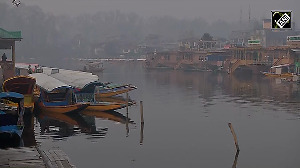This election has some striking resemblances to the landmark one of 1977, with sub-caste combinations and antipathies still the bedrock of measures

It was June 25, 1975, a scorching day. Towards the evening, when the sun's fury had abated, Ravindra Kishore Sinha, then a young reporter, now a member of the Rajya Sabha and the Bharatiya Janata Party national executive, walked into the room of the state's home secretary, R N Das, a 1962 batch Indian Administrative Service officer, in search of news.
Very casually, as if he were preoccupied, Das said, "Ask your political friends not to sleep at home tonight." Sinha asked why. "We're expecting some announcement," said Das evasively. "There might be some arrests."
Sinha informed as many as he knew. Some believed him, others didn't. The next morning, Sinha awoke to large blank spaces in the newspapers. The Emergency of 1975 was to change political equations in Bihar forever. The upper castes had always been with the Congress. In fact, the winning combination for the Congress had always been an amalgam of upper castes, especially kayasthas (dating back to the days of Rajendra Prasad, Sachidanand Sinha and Mahamaya Prasad Sinha) and the Dalits.
Now, however, another kayastha, Jayaprakash Narayan -- was challenging the Congress' caste hegemony. More, he was able to create a new social combination, inviting the intermediate castes to the amalgam on the back of a promise of their empowerment.
Karpoori Thakur, chief minister of Bihar after 1977, began the process by introducing reservations for backward classes in government jobs. This caused the upper castes to return to the Congress -- in the 1980 Lok Sabha election, the party gave 70 per cent of seats to these castes.
The next turning point for the political mobilisation of caste was the Ramja-nmabhoomi movement. The upper castes in Bihar seemed to return to the BJP -- but so did some Yadavs, following the breakdown of the Janata Dal.
In many ways, the 2015 assembly election is 1977 redux in Bihar, although there are important differences. For the first time ever, the BJP is contesting on its own.
Theoretically, there is all-in unity between the best known backward leaders, Nitish Kumar and Lalu Prasad. It is this seeming unity that is forcing upper castes and Dalits into an uneasy embrace, to counterbalance the consolidation and rise of the intermediate castes. This is baffling. Nitish Kumar essayed his meteoric rise in 2005 (when he came to power in the assembly election in alliance with the BJP) with an empowerment appeal to a new interest group -- the Extremely Backward Classes -- and the upper castes which wanted governance and urban facilities. Now, both seem alienated from his administration. What happened in 10 years?
Extremely Backward Classes
"Simple," said an earlier minister of state-rank leader in the Nitish Kumar administration, now a bitter critic. "Nitishji promised to empower us, the EBCs -- and then turned around and joined hands with the man who is responsible for our current EBC status, Lalu Prasad."
Who are EBCs? This is a cluster of 114 castes, in which 85 or 86 are Hindu and 29 or 30 are Muslim. They are not dominant in any region but are dispersed all over the state and account for at least a fourth of the population. An important and vocal caste is the mallah-nishad or fisherfolk. "The nishad community was right up there, when Nitish Kumar gave a call for the empowerment of the EBC in his first term. We stayed with him through 2010 when he started his second term. But, after that, upper castes began to dominate, politically but even more important, in the administration," says a nishad leader.
Power calculations
To have 'power' in Bihar, it is important to control seats in the Vidhan Sabha. But, it is even more important to have 'your man' in the administration. If the director-general of police, superintendent of police or the chief secretary is from your caste, you will get protection even if in the wrong.
EBC leaders cite several cases. In Lakhi Sarai a few months earlier, a young woman police officer led a crackdown on the stone mining mafia.
When the top bureaucracy in the Nitish Kumar administration asked her why, she should have known better than to remark flippantly that it was the bhumihars (upper castes) who were the force behind this group. A few weeks later, she was 'trapped' in a case and suspended. In another district, when a liquor mafia operated by upper castes was dismantled, as many as four SPs, including two Dalits, were transferred.
"Nitish Kumar rose because he empowered backward castes which were less fortunate. But, the vehicle he chose for this empowerment was upper caste bureaucrats. So, at the end of 10 years, things stayed where they were for us," said the mallah leader.
The net result is, a person like Mukesh Sahani, a mallah, returned from Mumbai after a successful film career (he organised the sets for films like Bajrangi Bhaijaan) to plunge into mallah politics, has now accused Nitish Kumar of 'betrayal' of the EBCs. This was even after Kumar included nishads into the list of scheduled tribes, which means a bigger reservation cake for the community -- by no stretch of imagination is the nishad a tribe.
Caste lives in Bihar. And, elections bring out divisions in all their splendour. The thinking is now -- the 15 per cent or so upper castes are with the BJP. This is neutralised by the 15-odd per cent Muslims who will vote against the BJP.
Most of the Yadavs, around 15 per cent of the population, will vote for the Nitish-Lalu mahagathbandhan (grand alliance). But a small number will also go with the BJP. However, it is the EBC on which all parties are working. If the EBC can be fractured, despite obvious handicaps, the BJP-led National Democratic Alliance will have penetrated the Nitish-Lalu armour.
- Complete coverage: Battle for Bihar, 2015











